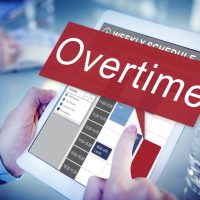Stay in Change to Overtime Regulation Leaves Employers Confused

As many Illinois employers and employees have heard in the media, earlier this year the U.S. Department of Labor revised its regulations that increased the base amount an employee must earn each week to be classified as an exempt employee. The revised overtime regulations were slated to become effective on December 1, 2016. However, these changes to the rules governing exempt employee status are now on hold after a Texas judge entered a preliminary injunction against the Department of Labor and its implementation of these rules.
The injunction was entered by Texas District Court Judge Amos L. Mazzant on November 22, in response to a request for an injunction filed by a group consisting of both business groups and state governments. Judge Mazzant determined that the Department of Labor did not have the authority to pass such a sharp increase to the salary basis test used to classify an employee as exempt under the Fair Labor Standards Act (FLSA). “Congress intended the EAP [executive, administrative, or professional] exemption to depend on an employee’s duties rather than an employee’s salary. Nothing in the EAP exemption indicates that Congress intended the Department [of Labor] to define and delimit with respect to a minimum salary level.” The judge’s injunction put the rule changes on hold, and the Department of Labor has said it will appeal Judge Mazzant’s ruling.
The effect of the court’s ruling, and whether or not the changes will become effective, is somewhat unclear. As of now, the Department of Labor’s plan to file an appeal of the injunction could result in the cancellation of the injunction and reinstatement of the increased salary cap. However, if the Court of Appeals sides with the Texas judge’s decision, then the injunction would remain in place until the final resolution of the case.
Many employers had already enacted the changes in their organizations, by either increasing the salaries or changing the classification of certain employees to non-exempt, prior to the court’s ruling. A retraction of promised raises would surely cause dissatisfaction among employees, although switching an employee back to exempt status might not be as great of a challenge. Employers are encouraged to speak with a labor and employment attorney to discuss how to respond to the ambiguous state of federal overtime regulations in their own organization.
For assistance with issues relating to Illinois employment law, contact the knowledgeable and effective Chicago area labor and employment attorneys at MacDonald, Lee & Senechalle for a consultation, in Hoffman Estates at 847-310-0025, and in Des Plaines at 847-298-5030.
